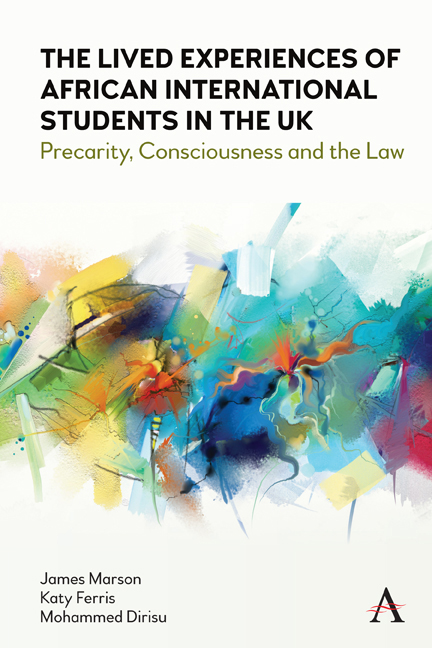 The Lived Experiences of African International Students in the UK
The Lived Experiences of African International Students in the UK Book contents
- Frontmatter
- Contents
- Preface
- Acknowledgements
- Legislation
- Case Law
- 1 Introduction
- 2 Methodology
- 3 Student Migration and Global Inequality
- 4 Migration as a Socio-Legal Phenomenon
- 5 The ‘Student-Migrant-Worker’ Meets ‘Precarity’
- 6 The ‘Utterly Transactional Worker’
- 7 Semi-Legal Working?
- 8 Conclusions
- Bibliography
- Index
2 - Methodology
Published online by Cambridge University Press: 13 September 2022
- Frontmatter
- Contents
- Preface
- Acknowledgements
- Legislation
- Case Law
- 1 Introduction
- 2 Methodology
- 3 Student Migration and Global Inequality
- 4 Migration as a Socio-Legal Phenomenon
- 5 The ‘Student-Migrant-Worker’ Meets ‘Precarity’
- 6 The ‘Utterly Transactional Worker’
- 7 Semi-Legal Working?
- 8 Conclusions
- Bibliography
- Index
Summary
Introduction
This chapter outlines the methodical design, theoretical framework, data collection method, researcher situatedness and the analytical process used in the empirical data presented in this book. We also explain the ethical considerations, and the inherent justifications, strengths and limitations of the adopted approach.
Methods Design
For this study, we chose a qualitative, case study design, drawing from both ethnographic observations and in-depth interviews. The selection of a purely qualitative paradigm is informed by this book's ambition for a holistic, fluid account of subjective behavioural patterns, experiences and the consequent meaning-making process of the actors within the study population. This objective pre-empts the viability of quantitative methods due to their rigidity (Creswell 2009). Yet, qualitative methods are especially appropriate here for three principal reasons. The first being that interpretive methods provide the researcher sufficient latitude to adapt to emergent patterns in real time (Creswell 2009; Yin 2017). For example, the aims of this study began with a focus on students’ engagement with temporary or parttime employment. However, this focus was corrected at the midway point of the project to place the emphasis on TAW, precarity and semi-legality due to their frequent manifestations during the early stages of data collection and analysis. This adaptation would not have been possible with quantitative measures. Second, the empirical socio-legal frames deployed, including semi-legality, legal consciousness, mobilisation and precarity, are innately idiosyncratic and subjective, this nuance being well captured by interactive methods but lost in numerical approaches (Creswell 2009; Hull 2016). Last, this selection is also informed by the contemporary socio-legal scholarship that has since moved on from the use of quantitative surveys so to statistically gauge the perceptions and use of law within a population, in search of a more rounded and layered interpretive rendition of law as it exists in everyday social locations (Harrington and Yngvesson 1990; Hull 2016; Silbey 2005).
Adopting a case study approach meanwhile amplifies the intensity of this research design as it allows for the collation and analysis of data through the combination of methods deemed necessary by the researcher (Bryman 2016; Creswell 2009; Yin 2017).
- Type
- Chapter
- Information
- The Lived Experiences of African International Students in the UKPrecarity, Consciousness and the Law, pp. 11 - 28Publisher: Anthem PressPrint publication year: 2022


